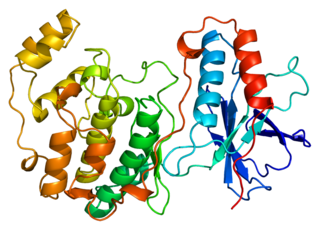A mitogen-activated protein kinase is a type of protein kinase that is specific to the amino acids serine and threonine. MAPKs are involved in directing cellular responses to a diverse array of stimuli, such as mitogens, osmotic stress, heat shock and proinflammatory cytokines. They regulate cell functions including proliferation, gene expression, differentiation, mitosis, cell survival, and apoptosis.
In molecular biology, extracellular signal-regulated kinases (ERKs) or classical MAP kinases are widely expressed protein kinase intracellular signalling molecules that are involved in functions including the regulation of meiosis, mitosis, and postmitotic functions in differentiated cells. Many different stimuli, including growth factors, cytokines, virus infection, ligands for heterotrimeric G protein-coupled receptors, transforming agents, and carcinogens, activate the ERK pathway.
Rhodopsin kinase is a serine/threonine-specific protein kinase involved in phototransduction. This enzyme catalyses the following chemical reaction:

Mitogen-activated protein kinase 1, (MAPK 1), also known as ERK2, is an enzyme that in humans is encoded by the MAPK1 gene.

Mitogen-activated protein kinase 14, also called p38-α, is an enzyme that in humans is encoded by the MAPK14 gene.

Mitogen-activated protein kinase 3, also known as p44MAPK and ERK1, is an enzyme that in humans is encoded by the MAPK3 gene.

Mitogen-activated protein kinase 8 is a ubiquitous enzyme that in humans is encoded by the MAPK8 gene.

Dual specificity mitogen-activated protein kinase kinase 2 is an enzyme that in humans is encoded by the MAP2K2 gene. It is more commonly known as MEK2, but has many alternative names including CFC4, MKK2, MAPKK2 and PRKMK2.

Dual-specificity mitogen-activated protein kinase kinase 4 is an enzyme that in humans is encoded by the MAP2K4 gene.

Ribosomal protein S6 kinase alpha-1 is an enzyme that in humans is encoded by the RPS6KA1 gene.

Activating transcription factor 2, also known as ATF2, is a protein that, in humans, is encoded by the ATF2 gene.

Mitogen-activated protein kinase kinase kinase 1 (MAP3K1) is a signal transduction enzyme that in humans is encoded by the autosomal MAP3K1 gene.

Mitogen-activated protein kinase kinase kinase 14 also known as NF-kappa-B-inducing kinase (NIK) is an enzyme that in humans is encoded by the MAP3K14 gene.

Ribosomal protein S6 kinase alpha-5 is an enzyme that in humans is encoded by the RPS6KA5 gene. This kinase, together with RPS6KA4, are thought to mediate the phosphorylation of histone H3, linked to the expression of immediate early genes.

Ribosomal protein S6 kinase alpha-2 is an enzyme that in humans is encoded by the RPS6KA2 gene.

Serine/threonine protein kinase NLK is an enzyme that in humans is encoded by the NLK gene. Its name is an abbreviation for Nemo-Like Kinase, Nemo (nmo) being the Drosophila ortholog of the mammalian NLK gene. This enzyme is a member of the Mitogen-activated protein kinase (MAPK) family, although not explicitly designated as such. It is a highly divergent, atypical member of the MAPK group, lacking most features so characteristic of most mitogen-activated protein kinases. Its activation mechanism and downstream targets are still not well characterized.

MAP kinase-interacting serine/threonine-protein kinase 2 is an enzyme that in humans is encoded by the MKNK2 gene.

Serine/threonine-protein kinase TAO1 is an enzyme that in humans is encoded by the TAOK1 gene.

Guanine nucleotide-binding protein G(k) subunit alpha is a protein that in humans is encoded by the GNAI3 gene.
Resumption of meiosis occurs as a part of oocyte meiosis after meiotic arrest has occurred. In females, meiosis of an oocyte begins during embryogenesis and will be completed after puberty. A primordial follicle will arrest, allowing the follicle to grow in size and mature. Resumption of meiosis will resume following an ovulatory surge (ovulation) of luteinising hormone (LH).













